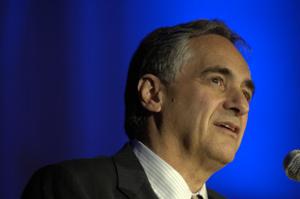|
||
      |
Presidential Q&A
The Magazine begins a series of interviews with University President Robert J. Zimmer. This issue’s topic: admissions.

When you met with the Alumni Association Board of Governors in mid-September, its members asked you whether—in light of Harvard’s decision to eliminate early admissions—Chicago planned to drop its own early-action program.
There are essentially three types of early admission: early decision—in which the student is obliged to attend if accepted; early action, one school—in which the student is not obliged to attend but may apply to only one school early; and early action, no restrictions—in which the student is not obligated to attend, and there are no restrictions on applying early to other schools. Early decision is the most common. Harvard had early action, one school. Chicago has had for many years, and continues to have, early action, no restrictions.
The concern expressed by many, including officially by Harvard, is that restrictive early-admissions programs, by not allowing students full options, work against those who need financial aid because they cannot compare financial-aid packages before making a decision. We have always believed that Chicago’s early-action, no-restrictions program, which only increases options for students, should have no negative effects at all and, quite the contrary, offers students more choices with no implicit penalty.
We’ve checked our admissions and applications data, and they strongly support this view: for applicants, admitted applicants, and matriculants at Chicago there are no significant differences in level of need or financial-aid award between early admissions and regular admissions. Thus, we believe that our present system offers more choices and has no discernible concomitant disadvantages, and we expect no changes in our program.
At the same time, we’ll continue to monitor our data and our position to ensure that our program reflects the University’s values and fulfills our goals. Chicago has always sought to recruit students from all social and cultural backgrounds, based on intellectual merit, eagerness to learn, and willingness to dedicate themselves to intellectual advancement.
In 2006 Harvard accepted 9.3 percent of its undergrad applicants. Meanwhile the College accepted 38 percent, compared to 71 percent in 1996. How low should Chicago go?
We should be striving to make known to as wide and diverse a prospective-student population as possible the particular nature of the education we offer. We should then be admitting and trying to recruit those who can most benefit from and contribute to that environment. As these efforts continue, it is plausible that the percentage of students admitted will continue to decline in the short run. There is no particular goal as to how “low” we should go, but there is a goal that we do these jobs effectively.
It’s been said that high-school students self-select, with Chicago attracting a special type of student. Could it be argued that the College has some practices—for example, its UnCommon Application—that help students select out?
There is, of course, something to self-selection. Nevertheless I believe strongly that there are more prospective candidates who would make wonderful students at Chicago who are not applying. The application we ask students to fill out should be as easy as possible in helping them provide routine information in a routine way—and as informative as possible in helping applicants to express themselves and the College to understand their capacity to benefit and contribute.
As college rankings go, it was a good year for Chicago—with a leap to No. 9 in the U.S. News & World Report rankings and a No. 1 rating from the Princeton Review for overall academic experience. Do the ratings matter? How much can—and should—the University try to influence those rankings?
The University should be fulfilling its missions of research and education at the highest level it can. Since that is not always well correlated with the measurements the various rankings use or how they are combined to form a linear order, rankings may or may not reflect different aspects of the quality of the University’s work. In this sense, the University should pursue its own course independent of rankings. On the other hand, rankings have an impact on public perception, and hence we should be attentive to providing data about our activities that is responsive to the information being sought.
As University president and as someone who long taught in the College, what message would you like to send about Chicago’s undergraduate education?
Education at Chicago is the strongest college education in the country. A fundamental principle of our curriculum is that we think it essential to introduce students to major domains of human knowledge—humanities, mathematics, civilizational studies, natural sciences, and social sciences—and to do so in a systematic manner and at the highest levels of intellectual rigor. The resulting education is intense, engaged, and immensely satisfying and enjoyable. It empowers students with lifelong skills of analysis, enabling them to succeed in whatever vocation they pursue. It also takes place in the context of an enriching and sustaining ambient college environment and a remarkable and dynamic city.
Like all faculty who have been at the University for an extended period, my belief in the power of this education was reinforced in every class I taught at every level.